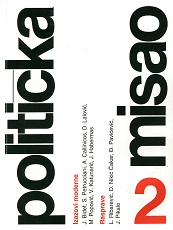Politološke dvojbe o Europskoj uniji: Potraga za određenjem
Political-science Dilemmas regarding the European Union: in search of a Definition
Author(s): Damir GrubišaSubject(s): Politics / Political Sciences
Published by: Fakultet političkih znanosti u Zagrebu
Keywords: European Union; super-state; state-like features; organisation-like features; supra-state federation; confederation; empire; political system of the European Union; political community sui generis
Summary/Abstract: This paper discusses the dilemmas regarding the nature of the European Union in contemporary political science and in the field of European Studies as a multidisciplinary and interdisciplinary field. The first part focuses on the evolution of the European Union from the original European Coal and Steel Community, via the European Economic Community, to its growth into a political union. The Maastricht Treaty, which lay the foundations of the European Union as a political union of its member states, instigated a debate on the actual nature of this supranational union as political construct. Consequently, the author analyses the various characteristics of the European Union, which is manifest in various forms, and asserts that it has some “state- -like features” and some “organisation-like features”, which are characteristic of international organizations. In the approach to the European Union as a supra-state community, some essential traits of both federation and confederation are simultaneously manifest, corresponding to two tendencies in the development of the European Union as a super-state. Moreover, there is the conception of the European Union as an empire. Finally, this paper specifies the tasks of present-day political science and the need to find a new heuristic instrument, which, according to the author, can be found in the conception of the political system that was introduced in political science (comparative politics) by Gabriel Almond and David Easton. Such an approach, which is nowadays further developed by Jean-Pierre Quermonne, Wolfgang Wessels and Simon Hix, is additionally strengthened by the fact that various models of democratic practice are being incorporated in the European Union in opposition to the basic, legitimacy-related democratic deficit, models which confirm the possible conclusion regarding a European Union as a complex community with many faces.
Journal: Politička Misao
- Issue Year: XLVIII/2011
- Issue No: 02
- Page Range: 61-90
- Page Count: 30
- Language: Croatian

